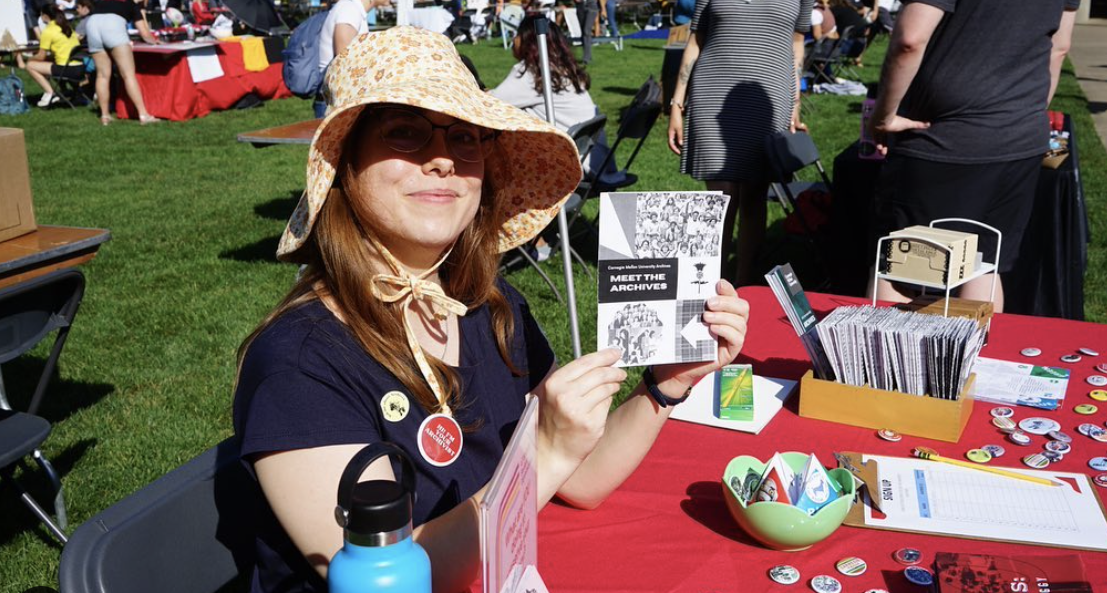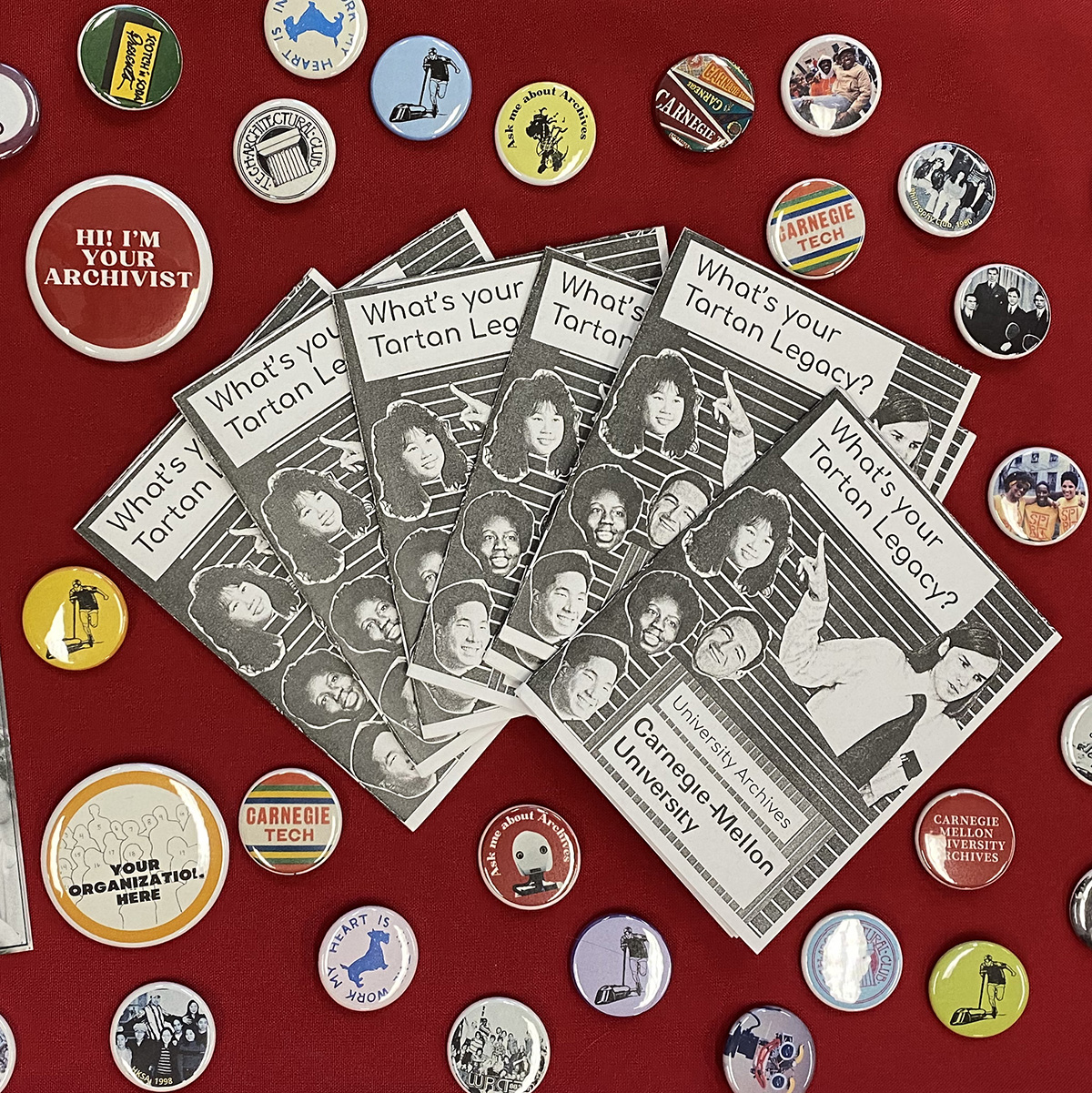
Community Collections Processing Archivist Crystal Johnson amplifies underrepresented voices throughout CMU’s history.
The Carnegie Mellon University Archives is home to more than 100 years of CMU history — but the Archives don’t tell the full story of the university. Founded in 1988, the Archives are relatively new compared to other academic archives at similar institutions, and are still missing documentation of various student groups and campus initiatives. In addition, traditional collecting methods have led to a collection of materials, records, and artifacts that skews predominantly straight, white, and male.
Today, the University Libraries is taking important steps to increase representation in its collections and better reflect Carnegie Mellon’s diverse past as an institution. ROAR (Repairing Our Archival Records) is a community archives initiative dedicated to collecting and preserving the history of overlooked communities. By identifying what we don’t have, finding existing records of diversity, and expanding community outreach, the Libraries is working to amplify the voices of those who have been historically underrepresented in Carnegie Mellon’s records over the years.
“We want to fill in the gaps to make our collections more reflective of what the CMU community has been and what it looks like now,” said Community Collections Processing Archivist Crystal Johnson, who joined the Libraries in 2021 to lead the charge. “Stories about people who are BIPOC, LGBTQ+, first-generation students, international students, or who have disabilities are vital to understanding what CMU is. Students should be able to see themselves in our history.”
Johnson wears several hats in the Archives, but one of her key roles is to process existing collections that are currently unorganized, undescribed, and largely unavailable to researchers. At the University Libraries, there are thousands of boxes of material that are basically unusable until an archivist can take inventory of their contents and make that information searchable with a finding aid. Many of these unprocessed collections may already contain valuable documentation about underrepresented groups — archivists and researchers just don’t know it’s there.
Johnson has been working her way through key collections to make them available on a wider scale. She processed the papers of Shirley Angrist, who led the Commission on the Status and Needs of Women (COSNW). These papers document the efforts made by faculty, staff, students, and alumni to address inequalities and discrimination faced by women at Carnegie Mellon in the late sixties and early seventies. Johnson has also worked with materials about Black labor, Black urban life, and disability and accessibility on campus.
Another important part of Johnson’s work is her outreach with student communities. Traditionally, archives wait for historic materials to come to them. But what is donated doesn’t always accurately reflect Carnegie Mellon as a whole, and archivists at the Libraries want to be more proactive in their collecting.
To be more inclusive, Johnson is working to build connections across campus and make sure student groups understand what the Archives offers. She tables at resource fairs, hosts button-making and printmaking events, and designs zines that introduce her work. It’s slow but rewarding work as groups increasingly involve Johnson in their storytelling efforts.

“We haven't worked with a lot of student organizations — historically we've focused on collecting and preserving records created by departments and ‘notable’ CMU faculty and alumni. But these records don't tell the whole story,” explained Project Archivist Emily Davis, who works alongside Johnson in the Archives. “Today, we can’t just walk up to groups and say, your story wasn’t important to us then but it is now, so give us all your stuff. We also don’t want to tokenize them or use them to check diversity boxes. We have to be deliberate about establishing trust over time, and Crystal has been doing incredible work to facilitate that.”
Community members understand their own communities far better than an outsider could, so Johnson often employs a method called post-custodial archiving, which enables organizations to digitize their own materials. The Archives then keeps a copy of the digital files, while the original physical materials remain in the community. This collaborative collection strategy allows the Libraries to diversify its collections, while offering communities the opportunity to describe themselves.
To further empower communities to tell their own stories, Johnson also offers workshops tailored to a group’s individual needs. She can help student organizations protect paper documents from water and light damage, or develop file naming and organization systems for digital records. And she’s always willing to chat more informally about materials as well, to help identify what could be valuable down the road.
“Event posters, photographs of activities, presentations, meeting minutes — these are all things that can be used to map your organization’s history,” Johnson explained. “Archivists like to say: when in doubt, don’t throw it out.”
In addition to building relationships with student organizations, Johnson is working with Student Leadership, Involvement, and Civic Engagement (SLICE) and the Center for Student Diversity and Inclusion (CSDI), along with alumni, to collaborate on projects. She’s currently serving as an archival consultant in an effort to explore historic documents related to LGBTQ+ organizations on campus, dating back to the 1980s.
“These materials document conversations, interests, campus climate, and spaces for advocacy in very specific moments in time,” said Rowshan Lang, special projects manager for the CSDI. “Crystal offers us essential practical knowledge — what we need to save and how to do so — and shines a light on what already exists in the Archives, and what gaps we might be able to fill in.”
Johnson is also turning her attention to processing new collections. Next on her list is the Gloria Hill Collection, featuring historical records related to the Carnegie Mellon Action Project (CMAP), which would eventually give rise to the CSDI. It also includes documents that explore the founding of Carnegie Mellon University in Qatar. “This will be an incredibly important collection to make accessible,” Johnson said.
The University Archives have open hours on Thursdays from 10 a.m. to 4 p.m. Stop by to learn more about ROAR, delve into the history of an organization you’re involved with, or find out how to preserve your group’s story. You can also get in touch to set up an appointment.
by Sarah Bender, Communications Coordinator
